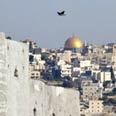
Guardian: Israeli regime resembles apartheid
Journalist who resided both in Israel, South Africa publishes 14-page-long report in distinguished British newspaper, describing how Israel discriminates against Palestinians
Journalist Chris McGreal resided in Israel four for years, after working as a journalist in South Africa. His report is accompanied by photographs comparing the two countries.
One of the photos shows a soldier beating a Palestinian youth and is presented next to a photo of a South African soldier confronting a black South African protester. There is also a photo of a soldier checking a Palestinian's documents next to a photo of a South African policeman checking a black man's documents.
The cover photo shows an Israeli-Arab with an Israeli identity card alongside a black South African with his identity card from 1970.
McGreal claims that there are few places in the world where governments construct a web of nationality and residency laws designed for use by one section of the population against another. Apartheid South Africa was one and so is Israel, according to the Guardian.
The report compares the white rule in South Africa to Israel's system of control over the Arab people. The security fence being built in the West Bank is dubbed the "apartheid wall" because it forces communities apart and grabs land.
The report takes as an example the interior ministry offices on each side. Jewish residents face a relatively short wait in an air-conditioned hall, while in east Jerusalem, Palestinians begin queuing in the middle of the night, or pay someone else to do so.
Once the sun comes up, the report says, they wait for hours in the heat for identity documents, or to register the birth of a child or the death of a parent. In Johannesburg, white people and black people were directed to different entrances of the home affairs ministry and afforded service - or not - according to their skin color.
The Guardian also provides data regarding the size of the population in east Jerusalem. According to the report, the Jewish population of east Jerusalem fled or was driven out in 1948, but a gradual return after 1967 turned to a flood as the settlements ate into the east of the city. Today, the population of Jewish settlements in and close to east Jerusalem has grown to nearly two-thirds that of the Arab neighborhoods, the report says.
Daniel Seidemann, an Israeli lawyer who has spent years fighting legal cases on behalf of Jerusalem's Arab residents, explains in the article that "houses were built for Israelis, but the lands were overwhelmingly taken from Palestinians."
"Muslims and Christians are barred from buying in the Jewish quarter of the Old City on the grounds of 'historic patterns of life of each community having its own quarter,' but that didn't prevent the Israeli government from aggressively pursuing activities to place Jews within the Muslim quarter," Seidemann says.
Israelis compare themselves to blacks
According to the reporter, many Israelis recoil at the suggestion of a parallel because it stabs at the heart of how they see themselves and their country, founded after centuries of hatred, pogroms and ultimately genocide. If anything, many of Israel's Jews view themselves as having more in common with South Africa's black population than with its oppressors.
The newspaper notes that Israelis are genuinely bewildered that anyone might see similarities between their society and the old South Africa. Where, they ask, are the signs directing "Jews" and "non-Jews" to match the "petty apartheid" of segregated buses, toilets and just about every other facility in Pretoria and Johannesburg.
The newspaper does mention that there are conspicuous differences between the two countries. Arab Israelis have the vote, they are mostly equal under the law and these days the Israeli courts generally protect their rights. Jews are a majority in Israel, while white South Africans were a minority. And Israel spent the first decades of its existence fighting for its life, the report says.
'There is basis for comparison'
The report also presents examples of Jews who used to live in South Africa, Holocaust survivors and even Israelis who lived during the apartheid and describe aspects in modern Israel that are reminiscent of the racial discrimination policy.
Former Israeli Ambassador to South Africa Alon Liel is quoted as saying that "if we take the magnitude of the injustice done to the Palestinians by the State of Israel, there is a basis for comparison with apartheid."
"Of course apartheid was a very different philosophy from what we do, most of which stems from security considerations. But from the point of view of outcome, we are in the same league," Liel says.
The Guardian claims that most of Jerusalem's Jews never cross the "green line" - the international border that divided the city until 1967 - and many of those that do go only as far as the Western Wall to pray.
If more Israelis were to travel deeper into the city they claim as their indivisible capital, the report says, they would encounter a different world from their own, a place where roads crumble, rubbish is left uncollected and entire Palestinian neighborhoods are not connected to the sewage system.
Shuli Davidovich, spokesperson for the Israeli Embassy in Britain, said in response that "the Guardian devoted 14 pages today to present Israel in the most negative manner, while the murder of an innocent Israeli citizen by a Palestinian terrorist only appeared at the end of a news item on page 23, which only mentioned that an Israeli woman was stabbed to death by a Palestinian and that the police reported that the act was politically, nationalistically-motivated."
"This is not the first time that the Guardian presents Israel in such a harsh manner. We have complained to them a number of times, and unfortunately the Guardian always has the same answer, that there is no fault in the way they cover the Israeli-Palestinian conflict," Davidovich said.










